新标准人教版选修6unit5thepowerofnaturereading公开课
新人教选修六Unit5Thepowerofnature-Reading[阅读课件]
![新人教选修六Unit5Thepowerofnature-Reading[阅读课件]](https://img.taocdn.com/s3/m/2c2d706e79563c1ec5da71fe.png)
breaking out
4.Why did the volcanologist's run out of the house into the back garden?
2. Where is Mount Kilauea? Mount Kilauea is in Hawaii.
3. Why is the lava that flows on Mount Kilauea more dangerous than the actual eruption ?
The lava flows down the mountain and can cover up or burn villages in its path. The rocks that erupt from the volcano usually don’t damage anything because no one lives near the crater.
information about the eruption.
5. What does the writer mean by using “lucky” in the sentence “ I was lucky enough to have a much closer look at it. ” ?
A. Because his bed began shaking. B. Because his bedroom suddenly became
as bright as day. C. Because he thought there was an
Unit 5 The Power of Nature Reading 课件-高中英语人教新课标选修六
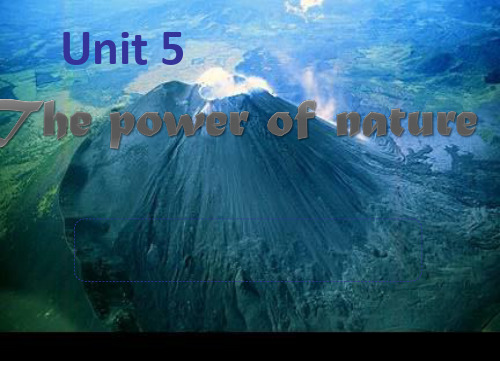
3. Which of the following description of an eruption is NOT correct ?
A. It causes great damage near the top of Mount Kilauea .
B.The places where the lava flows are usually seriously damaged .
C. It can be seen from a distance , even in a house garden .
D. The lava can fountain hundreds of metres .
• Mount Kilauea has produced lava more than fifty times in the last one hundred years.Sometimes the lava moves slowly.At other times it pours out very fast as a huge amount of pressure forces it from the volcano.During these times, it moves almost as quickly as water moving down the side of mountain.Sometimes Mount Kilauea produces a large amount of lava that seems like rivers of fire.When the lava from Mount Kilauea reaches the ocean, its fierce heat produces a great amount of steam that rises into the air.The lava is so hot that it continues to burn underwater for some time.The lava from Mount Kilauea continues to add
人教版英语选修六Unit 5 The power of nature(Reading)课件(共98张PPT)
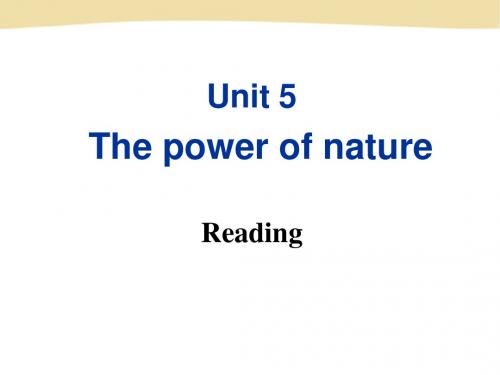
Part one (Para. 1- 2)
1. Why is a volcanologist’s job important? It can warn people when the volcano is going to erupt and save many lives.
2. Where is Mount Kilauea? In Hawaii.
5. What made the author realize that an
eruption occurred?
The light was caused
my bed began shaking by the red-hot rocks
a strange sound
and gas that erupted from the volcano.
importance: _p_ro_t_ec_t_o_r_d_in_a_r_y_p_e_o_p_le__fr_o_m__v_ol_c_a_n_oe_s_ __/S__a_v_e_p_e_o_p_l_e_’s_l_iv_e_s__b_y_w__a_r_n_in_g__t_h_e_m__to_____ __le_a_v_e__th__ei_r_h_o_m__e_s_. _ feelings (adj.): __n_e_v_e_r_b_o_r_e_d__ -- __e_x_c_it_e_d___ -- _f_e_e_l_a_li_v_e___
An Exciting Job
Working as a volcanologist
What does a volcanologist do? Is the work important?
His work can help save many lives because people in the path of the lava can be warned to leave their home.
人教版英语选修六Unit5 the power of nature(Reading:An excit
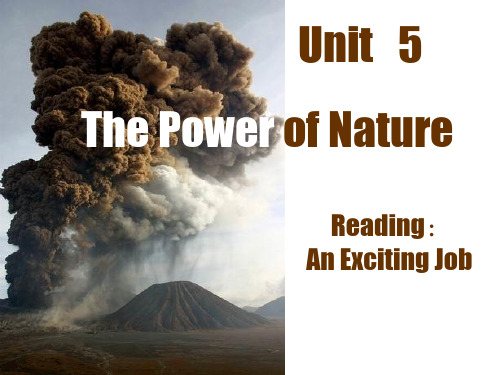
The writer
his job
and told us one of his
in Mount Kilauea, Hawaii
What does a volcanologist do? Is the work important?
1. It’s an ___a_b_s_o_lu__te__ fact. 2. ----Do you let your kids walk alone at
night? ----__A__b_so_l_u_t_e_ly__ not. 3.You are ___a_b_s_o_l_u_te_l_y_ right. 4. It’s __a_b__so_l_u_t_e_ly_ impossible. 5. I have __a_b_s_o_l_u_te__ trust in you. 6.There is no ___a_b_s_o_lu_t_e_ standard for beauty.
Part 2 (Para 3) Fill in blanks.
However, thee_ru_p_t_io_n__o_f _v_o_lc_a_n_oitself is really exciting to watch and I shall never forget my first sight of one. It wasin_t_h_e_s_e_co_n_d_w_e_e_k_after I arrived in Hawaii. I was fa_s_t _as_l_eewp hen suddenly my bed began shaking and I heard a strange sound, likaer_ai_lw_a_y_t_ra_i_n_p_a_ss_i_ng__m_y_w_i_n_do_w. At first, I didn't take much notice. I was about to go back to sleep when suddenly my bedroom became as__br_ig_h.tIarsadnaoy ut of the house into the back garden where I could see Mount Kilauea in the distance. There had been an eruption from the side of the mountain andr_e_d_h_o_t_l_a_v_a_w_a_s__fo_u_n_t_a_in_i_nghundreds of metres into the air. It was ana_b_s_o_lu_t_e_ly_fantastic sight.
Unit 5 The power of nature-reading[新人教版选修6]
![Unit 5 The power of nature-reading[新人教版选修6]](https://img.taocdn.com/s3/m/e4d144e3a8956bec0975e3cf.png)
2. Guess: what kind of things a volcanologist might do. Please work with partners and write your guess down.
Skimming
• Read the passage and answer: • Why is the author's job important?
My bed began shaking
A strange sound
My bed room became as bright as day
Red hot lava was fountaining hundreds of metres into the air
An absolutely fantastic sight
Unit 5
reading
Can you imagine climbing into a live volcano in order to measure the temperature of the boiling rock inside? Can you imagine doing such dangerous work as part of your job? Do you think you would enjoy studying volcanoes as a job? Answer "yes" or "no" to these questions to find out if you would be suitable for this work.
Looked down into the red, boiling centre
新标准人教版选修6unit5thepowerofnaturereading公开课
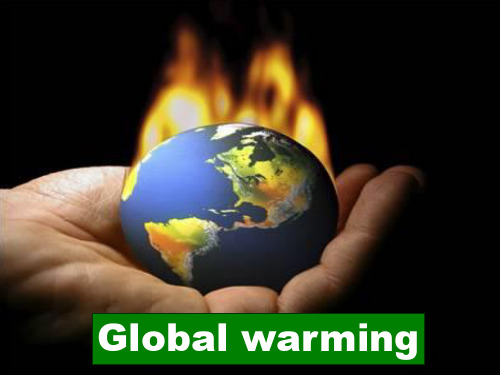
crater
erupt v. eruption n.
lava absolutely fantastic
volcanic ash
fountain
The hot lava is____f_o_un_t_a_in_i_ng___ hundreds of metres into the air.
Many houses _a_r_e__b_u_r_n_t_t_o_t_h_e_g_r_o_u_n_d__.
in panic
The crowd _a_r_e_m_a_k_i_n_g_t_h_e_ir_w__a_y_to a safer place.
The destruction of Pompeii
Collect and evaluate information about volcanoes.
Are you suitable for this work?
Questions
Yes No
1 Do you like working outside as welu enjoy travelling to unusual places? 3 Do you enjoy taking risks?
Tsunami
Volcano
Have you ever seen a volcano?
Where is it probably for a volcano to erupt?
Near the oceans.
How many types of volcanoes are there?
an active volcano an extinct volcano
arrived in Hawaii D It was in the first night after I
高中英语人教版选修6Unit5thepowerofnaturereading教案(系列五)
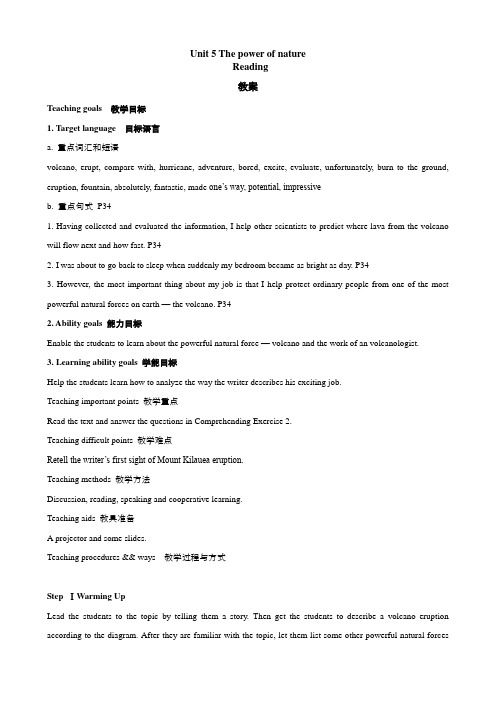
Unit 5 The power of natureReading教案Teaching goals 教学目标1. Target language 目标语言a. 重点词汇和短语volcano, erupt, compare with, hurricane, adventure, bored, excite, evaluate, unfortunately, burn to the ground, eruption, fountain, absolutely, fantastic, made one’s way, potential, impressiveb. 重点句式P341. Having collected and evaluated the information, I help other scientists to predict where lava from the volcano will flow next and how fast. P342. I was about to go back to sleep when suddenly my bedroom became as bright as day. P343. However, the most important thing about my job is that I help protect ordinary people from one of the most powerful natural forces on earth — the volcano. P342. Ability goals 能力目标Enable the students to learn about the powerful natural force — volcano and the work of an volcanologist.3. Learning ability goals 学能目标Help the students learn how to analyze the way the writer describes his exciting job.Teaching important points 教学重点Read the text and answer the questions in Comprehending Exercise 2.Teaching difficult points 教学难点Retell the writer’s first sight of Mount Kilauea eruption.Teaching methods 教学方法Discussion, reading, speaking and cooperative learning.Teaching aids 教具准备A projector and some slides.Teaching procedures && ways 教学过程与方式Step ⅠWarming UpLead the students to the topic by telling them a story. Then get the students to describe a volcano eruption according to the diagram. After they are familiar with the topic, let them list some other powerful natural forcesand discuss the ways human beings protect themselves from the natural forces.T: Listen to me carefully. I will tell you a story about a strange city. The strange city named Pompeii is a dead city. No one has lived there for nearly two thousand years, yet every year thousands of people travel from distant countries to visit it. It died suddenly in a terrible rain of fire and ash. Tons of hot ash fell on Pompeii, hiding it from sight. For three days the sun didn’t break through the clouds of ash in the sk y. Then the whole city shook and buildings fell down. When everything was calm, Pompeii was buried deep. A city disappeared and people there lost their lives too. Can you guess what had happened to the city?S1: There must have been a terrible earthquake. After the terrible quake, everything was destroyed.T: Yes. It’s one kind of the causes. Any different ideas?S2: Maybe a volcano erupted and a terrible rain of fire and ash fell on the city.T: You got it! Mount Vesuvius, which had slept quietly for centuries, erupted suddenly. It destroyed the city Pompeii. How terrible! Have you ever seen a volcano erupting? Please turn to page 33. Look at the diagram. Describe a volcano erupting using the diagram and the given words.S3: When boiling rock erupts from the volcano, the red hot lava rushes hundreds of metres into the air and a cloud of ash goes straight up into the air. Ash cloud forms. Rocks, fire, ash fall onto the ground. The lava flows slowly down the mountain. It buries everything in its path under the molten rock.S4: Sometimes, volcano erupting can cause some other disasters like earthquakes, fire and ground sea.T: How powerful the nature is! The lava can buries everything in its path. A volcano erupting can damage a city. A flood can carry everything in its path, while a fire will damage everything it meets. It seems that we human beings are powerless in front of these natural forces. What can we do to protect ourselves from powerful natural forces? Please work in groups of four to list some other natural forces and discuss the ways that human beings protect ourselves.A few minutes later.T: Who would like to share your opinion with the class?S5: I’d like to talk about volcano. Sometimes, the volcano gives warnings in the form of many small earthq uakes. And scientists can provide warnings of possible volcano explosions with the help of equipment. So the government can help people who live near the volcano leave their homes before erupting.S6: We are more familiar with fire. In fact, it can be avoided most of the time, if we are careful in our daily life. I know a way of controlling the fire. Firefighters burn the trees which are in the path of the fire, so there is nothing to burn when the fire arrives.S7: Flood always happens in the south of our country. Predication is very important. Scientist keep observing thelevel of the water during the summer. People strengthen the bank and move to higher land.S8: We have learned more about earthquakes. People have learned many ways to protect themselves. For example, earthquake happens, if you are in bed, stay where you are and protect your head with a pillow. If you are outdoors, find a clear spot away from buildings, trees and streetlights.S9: I think the best way is to move to a safer place where fire, earthquake, flood and hurricane will never happen.Step ⅡPre-readingGet the students to answer the six questions on page 33 to find out whether they will enjoy working as a volcanologist. And then get them to talk about the occupation according to the questions.T: I see. Prediction is very important. We can say scientists play an important part in protecting people from natural forces. Would you like to study volcanoes? And do you want to be a volcanologist?Ss: Yes.T: Let’s test whether you are suitable for this job or not. Answer “yes” or “no” to these que stions on page 33.The students answer the questions to see if they are suitable to be a volcanologist.T: Are you suitable for the job? Who can tell us what kind of person can be a volcanologist?S1: First he must be brave enough because he must climb into a live volcano to take the temperature of the boiling rock inside.S2: I think interest is the most important. He should show great interest in studying rocks and volcanoes.S3: He should be interested in travelling to unusual places and like adventure in his life.S4: If you want to be a volcanologist, you should enjoy working outside because a lot of work need to be done outdoors.Step ⅢWhile-readingScanningGet the students to read the passage quickly and accurately. Give them a couple of minutes to look through the whole passage. Tell them to read the text silently and then ask them some detailed questions about the text.T: What do es a volcanologist do? Is the work interesting? Let’s read a passage written by a volcanologist. The volcanologist enjoys his job very much. He described his exciting job. And he wrote down his first sight of an eruption. Now let’s read the text quickly an d find out the answers to these questions Comprehending Exercise 1 on page 35 .Several minutes later.Check the answer..SkimmingIn this part, the students will read the text quickly to get the general idea of the passage. Check the answers with the whole class, then explain some sentences or words that the students may find hard to understand.T: Now please read the text again and try to get the main idea of the passage in groups of four.Three or four minutes later.T: Have you got the general idea of the text?It wasn’t very easy to walk in these clothes, and we slowly made our way to the edge of the crater and looked down into the red, boiling center. Though I was a little afraid, I wanted to climb down into the crater to collect some lava. But this being my first experience, I could only stayed at the top and watched the two scientists. At that time I determined to be a volcanologist forever.DiscussionT: In the writer’s opinion, his job is the greatest one. Do you like this occupation? Why or why not? Discuss in groups of four.S2: I would not like to be a volcanologist. I prefer to work in an office to do some research work. It’s a waste of time and energy to spend so much time traveling.S3: I hope to be a vocanologist. You’ll be proud of yourse lf when people escape before volcano erupting because of your work. Also, I am interested in the rocks and other things that make up the surface of the earth. I want to know the secret of the earth.S4: It is not my ideal occupation. I like traveling to unusual places, studying different cultures, talking with interesting people and collecting interesting things. But I’m not brave enough to climb into a live volcano to take the temperature of the boiling rock inside.S5: I don’t like this job. It’s too dang erous. If the volcano erupts suddenly when you are collecting the lava, maybe you will lose your life.T: Well, if you meet the writer, what kind of questions would you ask him?S6: Aren’t you afraid when you walk towards the volcano? It’s so hot and the v olcano may erupt again.S7: What should you do if you get lost on your way to the volcano?S8: When did you begin to be interested in volcanoes?S9: How will you escape if the volcano erupts suddenly?S10: Are there any living things in volcanoes?S11: Why do people live near the volcanoes since they may lose their homes or even lives?Writing characteristicsT: Good! If you are interested in this occupation, you can get more information on the Internet. Now who can summarize the writing style and techniques of this text?The teacher can ask the students to have a discussion in pairs or groups, and then ask some of them to show their ideas.Sample answers:This passage was written by a volcanologist. He uses the first person to describe his exciting job and his experience and express his true love for his job. The words are vivid and the description is natural, which makes the readers feel as if they were watching the volcano eruption and begin to like the occupation. For example, he uses “like a railway train passing outside my window”, “suddenly my bedroom became as bright as day” and “red hot lava was fountaining hundreds of metres into the sky” to describe the big noise and fantastic sight of volcano eruption. To tell readers that his job is intere sting, the writer uses several “sometimes”, which makes the readers feel the job is extremely interesting and want to be a vocanologist. The writer talks about the volcano objectively. He points out the damages of volcano but he praises its fantastic sight at the same time.T: What can we learn from the text?S: The key word of the text is “exciting”, which is the focus of the passage. By telling the readers his everyday work, the importance of his job, his first sight of volcano eruption and his sincere love for his job, the author proves it’s his chief enjoyment to be a volcanologist. And I appreciate the writer’s attitude towards nature. We should love nature and we can do something to minimize the damage caused by natural forces.Step ⅤHomeworkT: No w it’s time for homework. Today you have two tasks to finish after class. The first task is to finish exercises in Discovering useful words and expressions on page 35. These exercises will help you practice the words and expressions we’ve just learned. The second one is to retell the text. That’s all for today. See you tomorrow.。
Unit 5 The Power of Nature Reading 课件 人教新课标选修六
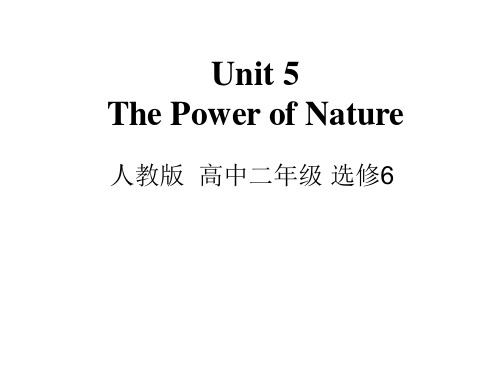
On the top of Changbaishan, Tianchi is a deep lake that has formed in the crater of a dead volcano.
A: The writer’s experience of watching the volcanic eruption
B: The writer’s job and its importance
C: The writer’s enthusiasm about his job and volcano.
Thank you!
Para3
Put the events into the correct order. A. I heard a strange sound. B. My bedroom became as bright as day. C. My bed began shaking. D. I saw red hot lava was fountaining hundreds of metres into the air.
Who can give us the most information about volcano ?
A. movie-makers B. volcanologists C. teachers
volcanologist = volcano + log(y) + ist
人教版英语选修六Unit5 the power of nature(Reading:An excit
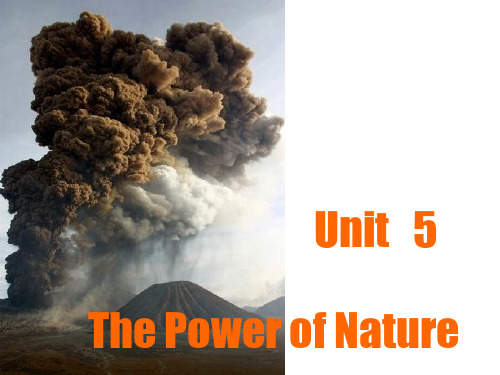
B. It was his first sight of an eruption. C. It was the first time for him to watch the crater. D. both B and C.
Unit 5 The Power of Nature
What happened on May 12, 2008 in China?
What happened in Zhouqu, Gansu province on August 7, 2010?
landslide
flood
drought
snowstorm
dangerous than the actual eruption.
F 3. The day after the eruption the author and two other
scientists climbed down into the crater to collect some lava for later study.
_f_e_e_l__a_li_v_e___
Part two (Para. 3- Para. 4)
1.Why is the lava that flows on Mount Kilauea causes more damage than the actual eruption?
2.What made the author realize that an eruption occurred?
新课标人教版选修六教案Unit--5-The-power-of-nature

Unit 5The power of naturePeriod 1Warming Up,Pre-reading,Readingand ComprehendingAims:1.To learn about some disasters that are caused by natural forces,how people feel in dangerous situations and the ways in which humans protect themselves from natural disasters.2.To learn how the information is organized.教学过程Step 1Warming up1.Warming up by looking and talkingShow the following pictures to the students and let them know about the power of nature and talk about them.Sample expressions:What happened in the pictures above?Do you know any other natural disasters?Please work with your partners and make a list of natural disasters(such as earthquake,snowstorm,flood,drought).Have you ever seen a volcano?(Some new words:lava erupt/eruption crater active/dormant/extinct volcanoes...)2.Warming up by reading the passage below.Step 2Pre-reading1.Can you imagine climbing into a live volcano in order to measure the temperature of the boiling rock inside?2.Encourage students to talk more about volcanoes by looking at the following pictures.Step 3Reading and comprehending1.Fast-reading:Ask students to skim the passage so as to get the key words and general idea of each paragraph and answer the question:What's the main idea of the text?2.Read the passage carefully and answer the following questions.(1)Why is a volcanologist's job important?(2)Why is the lava that flows on Mount Kilauea more dangerous than the actual eruption?(3)Why was it difficult for the writer to walk towards the edge of the crater?(4)What does the writer find impressive about volcanoes even after studying them for many years?(5)What did the author think it was when an eruption occurred?(6)Why did the scientists look like spacemen?Suggested answers:1.This passage is a first-person account of a volcanologist's experiences.The volcanologist described his exciting job and wrote down his first sight of an eruption.2.(1)Volcanologists study volcanoes so that they can warn people when the volcano is going to erupt and so save many lives.(2)The lava flows down the mountain and can cover up or burn villages in its path.The rocksthat erupt from the volcano usually don't damage anything because no one lives near the crater.(3)The author was wearing special protective clothing that made it difficult to walk.(4)The author finds their beauty and their potential to cause great damage very impressive.(5)He thought it was an earthquake.(6)Because they wore white protective suits that covered their whole body.3.Ask students to scan for detailed information and discuss the following question with their partners and be prepared to report to the class.Question:Having learned a little more about the work of a volcanologist,do you think it is an occupation you would enjoy?Give you reasons.Suggested answers:No,I probably wouldn't enjoy this job because I wouldn't have to live in other countries and I don't like being in dangerous situations,either.Above all,I'm not very good at science.ORYes,I'd love to do a job like this because I would enjoy working outside and I think I would enjoy the adventure.It would be exciting to meet people from different countries and I would feel good about helping people avoid danger.Step 4Language studyDealing with any language problem if any(words or sentences students might not understand)to help the students to have a better understanding of the text.Step 5Listening,reading aloud and underliningAsk students to read the passage aloud to the tape and let them pay attention to the pronunciation of each word and the pauses within each sentence.Tell them to pick out all the useful expressions or collocations from the passage while reading and copy them to the notebook after class as homework.Collocations:make one's way,a live volcano,be about to do,look down into,out of the way,be covered with,burn to the ground,attach...to...,compare...with...,run out of Step 6Structure analyzingAfter reading,ask students to discuss the text structure.Keys for reference:This passage is a first-person account of a volcanologist's experiences.The volcanologist described his exciting job and wrote down his first sight of an eruption.The first paragraph introduces the topic and the theme of the text.The rest of the text presents the information in chronological order.A feature of an account of a volcanologist's experiences is the abundance of time expressions.The last sentence of the report functions as a conclusion.In addition,each section begins with a topic sentence.Step 7RetellingAsk students to talk about the volcanologist's experiences in their own words.Give them some key words and expressions.Then let them try to retell the passage.Step 8Homework1.Learn the useful new words and expressions in this part by heart.2.Try to find more pictures showing natural forces and talk about them.Step 9Reflection after teachingPeriod 2Language Study (1)Aims:To get the students to learn to use the following important new words and phrases freely:absolutely,make one's way,alongside,appoint,wave,suit,potential,actual.教学过程Step 1Revision1.Check the homework exercises.2.Ask some students to say something about the power of nature.Step 2Reading and findingGet students to read through Warming Up,Pre-reading,Reading,Comprehending and Learning about Language to underline all the new words and useful expressions or collocations in these parts.Read them aloud and copy them down in the exercise book.Step 3Practice for useful words and expressions1.Turn to Page 36.Go through the exercises in Discovering useful words and expressions with students and make sure they know what to do.2.Give them several minutes to finish the exercises.They first do them individually,and then discuss and check them with their partners.3.Check the answers with the whole class and explain the problems they meet where necessary.Step 4Vocabulary study1.alongside(P34)【原句再现】I travel to unusual places and work alongside people from all over the world.我跑的地方是稀罕奇特的地方,和我一道工作的人来自世界各地。
人教版选修6_Unit 5 The power of nature reading(共43张PPT)

Careful reading
(10 mins)
• Read the passage carefully, and find out detailed information.
Para 1 1. The writer doesn’t mind the occasional danger of his job because________ . A. He travels to unusual places and meets interesting people from all over the world B. He likes the different ways of working C. He thinks his job the most important D. He is excited about dangers and feels alive
Find out main ideas of each part. Part 1(Para 1-2) Part 2(Para 3-4)
Part 3(Para 5)
The writer’s experience of watching the volcanic eruption The writer’s job and its importance The reasons for the writer’s enthusiasm about his job.
Unit 5
The Power of Nature
• Do you know any natural disasters ? let’s make a list of natural disasters which you have known.
earthquakeFra bibliotekfloods
人教版选修6_Unit 5 The power of nature reading(共43张PPT)
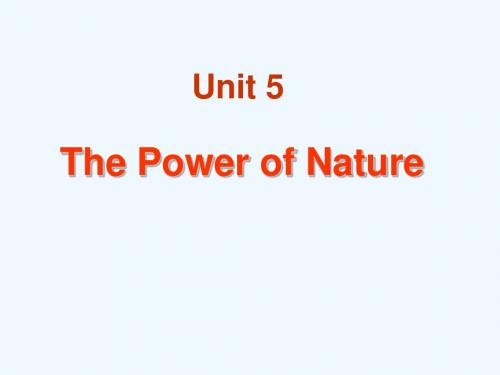
Find out main ideas of each part. Part 1(Para 1-2) Part 2(Para 3-4)
Part 3(Para 5)
The writer’s experience of watching the volcanic eruption The writer’s job and its importance The reasons for the writer’s enthusiasm about his job.
Careful reading
(10 mins)
• Read the passage carefully, and find out detailed information.
Para 1 1. The writer doesn’t mind the occasional 2. danger of his job because________ . 3. A. He travels to unusual places and meets interesting people from all over the world 4. B. He likes the different ways of working 5. C. He thinks his job the most important 6. D. He is excited about dangers and feels alive
What is the main idea of the text? The writer expressed his _____ love for his job volcanologist and told us his unusual as a_____________ experience ______________in Mount Kilauea, Hawaii. He explained the_____________of his job importance and described his first sight of an________. eruption
高中英语(人教版)选修六Unit 5 The power of nature-reading课件(共17张PPT)

3. What is the most popular tourist attraction in the reserve?
The answer: Tianchi or the Lake of Heaven.
4. What does Tianchi meanding
㈠Glance through these questions. Then skim this
passage about a tourist attraction in China and answer the questions. 1. In what province is Changbaishan? 2. What is a nature reserve? Why is Changbaishan a famous nature reserve? 3. What is the most popular tourist attraction in the reserve? 4. What does Tianchi mean? How was Tianchi formed? 5. What is the connection between the Manchu people and Tianchi?
Don’t forget to make a _w__is_h__ to g__u_a_ra__n_te_e_ your love will be as deep and l_a_s_t_in_g_ as the lake itself.
Ⅲ. Performance
★Perform the story about the father of the Manchu Role A: the first young woman Role B: the second young woman Role C: the youngest girl Role D: a bird Rold E: a handsome boy(the father of the Manchu people)
高中英语(人教版)选修六Unit 5 The power of nature-reading课件(共16张)

(Para 1-2)
of watching the volcanic eruption
Part 2 (Para 3-4)
Part3 (Para 5)
The reasons for the writer’s enthusiasm about his job
The writer’s job and its importance.
Do you think volcanologist is an occupation you would enjoy? Give your reasons
Task 3 Let’s fill in the blanks according
to the text!
I’m a volcanologist. I travel to unusual places and meet inbtoerreedsting peoHpalveinfgromcolalellctoevder the world. I’m never _______(bore). _____________(collect) and evaluated the informatioUnnfoofrtvuonlcaatenloes, I help other scientists to predicyt where lava will flow next and hhoawvefabsete. n__c_o_v__e_r(efdortunate), we can’t move people’s homes out of the ewrauyp,taionnd many houwsheisc_h____________(cover)with lava or burned to
Tornado
人教版高中英语选修六Unit 5 The power of nature Reading

The first experi ence
The day ◆ We 10 _m__a_d_e_o_u_r_w_a_y__ after the to the edge of the crater eruption with protective suits and
2. What did the scientists do after the eruption? 3. Why did the scientists have to get close to the volcano after it began erupting?
What made the author
2. Find out main ideas for each part.
Part 1 (Para 1-2) The writer’s _j_o_b_ and its _i_m_p_o_r_t_a_n_c_e__.
Part 2 (Para 3-4) The writer’s _e_x_p_e_r_ie_n_c_e_ of watching the volcanic eruption.
So the word “beauty” not only refers to the fantastic scene of the volcanic eruption, but the power to produce life.
The writer
Profe Volcanologist ssion
Unit 5 The power or nature
• Teaching aims:
• 1. talk about the vocanologist’s work and his experience
人教版(新课程标准)选修6Unit5ThepowerofnatureReading课件

*If an action takes place obviously before another, we use perfect -ing form instead of -ing.
Key words information
My job
Our work
Supporting information
collect, evaluate help (predict)
(1) direction/path/route (2) speed
save cannot move; … covered and burned
Brainstorm some new words related to volcano
eruption(喷发) erupt lava (熔岩) crater(火山口) ash(灰)
Mountain Kilauea
1.What can we do to protect people from the power of volcano eruption?
Language focus 2:link words (逻辑关联词) Of these two ideas, are they parallel
(并列) or contrasting (对照、转折)?
What’s the link-word here? unfortunately I felt bored with English. Unfortunately, … I like English. Unfortunately, … Belts (安全带) are important for drivers and
- 1、下载文档前请自行甄别文档内容的完整性,平台不提供额外的编辑、内容补充、找答案等附加服务。
- 2、"仅部分预览"的文档,不可在线预览部分如存在完整性等问题,可反馈申请退款(可完整预览的文档不适用该条件!)。
- 3、如文档侵犯您的权益,请联系客服反馈,我们会尽快为您处理(人工客服工作时间:9:00-18:30)。
In August of AD 79, Mount Vesuvius erupted. The entire of the mountain exploded, and a huge black cloud rose into the air. Soon stones and hot ash began to fall on Pompeii. When the eruption ended two days later, Pompeii was buried under 20 feet of stones and ashes. Almost all the people were dead.
arrived in Hawaii D It was in the first night after I
死火山
活火山
(no longer active)
a dormant volcano 休眠火山
(not active now, but be able to be active in the futre)
1. How is a volcano formed?
The rocks under the earth become hotter and hotter and erupt from the mountain.
An Exciting Job
Who will climb into a live volcano to take the temperature of the boiling rock inside?
volcanologists
What kind of things might a volcanologist do?
Collect and evaluate information about volcanoes.
Are you suitable for this work?
Questions
Yes No
1 Do you like working outside as well as inside?
2 Do you enjoy travelling to unusual places? 3 Do you enjoy taking risks?
natural disasters
earthquake
thunder/ lightning
forest fire
flood
drought
snowstorm
sandstorm
landslide
hurricane
typhoon
tornado/cyclone
Tsunami
Volcano
importance
Part 3(Para 5)
The reasons for the writer’s enthusiasm about his job.
Scanning the text and choose the best answer
1.What is the writer? A He is a doctor B He is a teacher C He is a scientist D He is a volcanologist
D
2. When did he first see an eruption? A It was in the second week after I
arrived in Hawaii B It was in the second day after I
arrived in Hawaii C It was in the third night after I
Many houses _a_r_e__b_u_r_n_t_t_o_t_h_e_g_r_o_u_n_d__.
ห้องสมุดไป่ตู้
in panic
The crowd _a_r_e_m_a_k_i_n_g_t_h_e_ir_w__a_y_to a safer place.
The destruction of Pompeii
Boiling rock erupts from the crater; the lava flows slowly down the mountain.
gas solid liquid
vapor, carbon dioxide, nitrogen (氮), sulphur (硫磺)
bits of rock and volcanic ash, etc.
Skimming the text and try to find out main ideas of each part.
Part 1(Para 1-2)
The writer’s experience of watching the volcanic eruption
Part 2(Para 3-4) The writer’s job and its
Have you ever seen a volcano?
Where is it probably for a volcano to erupt?
Near the oceans.
How many types of volcanoes are there?
an active volcano an extinct volcano
4 Do you dislike doing the same thing every day?
5 Do you like adventure in your life?
6 Are you interested in studing rocks and other things that make up the surface of the earth?
lava (熔岩)
crater
erupt v. eruption n.
lava absolutely fantastic
volcanic ash
fountain
The hot lava is____f_o_un_t_a_in_i_ng___ hundreds of metres into the air.
